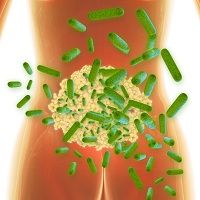Article
Obesity and Microbiota: What's Hype, What's Helpful?
Author(s):
What if obesity isn't necessarily a result of an imbalance in energy consumed compared to energy expended, but a much more complicated problem related to gut microbiota (among other things)?

What if obesity isn’t necessarily a result of an imbalance in energy consumed compared to energy expended, but a much more complicated problem related to gut microbiota (among other things)? That seems to be the direction in which science is headed as we try to address the global obesity epidemic. Researchers from The Netherlands discussed obesity from the point of view of disequilibrium in the July 2015 issue of Genes and Nutrition. Their review looked at manipulating human gut microbiota using antimicrobials, probiotics, fecal microbial therapy, prebiotics, and diet. They highlight inconsistencies.
With approximately 1.5 kg of bacteria in the average human gut, it’s reasonable to assume that microbiota have a role in weight control. Several studies have now proven that is the case. This indicates that with better understanding, microbiota could be a therapeutic intervention.
The authors covered several areas that have potential clinical implications. First, diet has an impact on gut microbiota, and is responsible for about 57 % of gut microbiota composition. An additional 12% is explained by genetics.
Second, most endocrinologists recognize obesity as a state of chronic, low-grade inflammation. And microbiota composition affects mucosal and systemic immune responses and energy metabolism. Gram-negative gut bacteria release lipopolysaccharide (LPS), which changes intestinal permeability and induce systemic inflammation and seem related to weight gain. Fermentation of indigestible dietary compounds creates metabolites that are energy sources and may indirectly mediate release of satiety hormones.
The researchers suggested several strategies to manipulate gut microbiota:
- Antibiotic use is under investigation, but has been found to promote and prevent obesity. In animals, antibiotics often promote growth, but generalizing this effect to humans is risky.
- Probiotics have been primarily studied in rodents using the Lactobacillus strain. Probiotic effect may be strain-specific, and research indicates they cause weight gain and weight loss. Dose and duration are still uncertain.
- Fecal microbiota transplantation could hypothetically re-establish a healthy gut in recipients. Concerns include poorly defined safety measures, the lack of a standardized treatment protocol, and reports of patients to trying it at home without medical supervision.
- Prebiotics like inulin and oligofructise seem to be able to reduce food intake, fat mass development and body weight. They may also enhance the gut barrier.
The researchers also noted that manipulating gut microbiota cannot and will not replace healthy diet and exercise.




